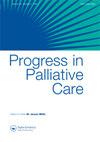转移性和局部晚期食管癌患者的姑息治疗需求评估
IF 0.8
Q4 PUBLIC, ENVIRONMENTAL & OCCUPATIONAL HEALTH
引用次数: 0
摘要
背景姑息治疗在改善无法治愈的食管癌患者的症状负担和生活质量方面发挥着重要作用。关于晚期食管癌患者姑息治疗需求的研究缺乏。目的了解晚期食管癌患者未满足的姑息治疗需求及其相关因素。设计我们进行了一项横断面观察性研究。研究/参与者我们在印度孟买的一家三级癌症中心招募了50名新诊断为局部晚期、不可切除或转移性食道癌的胸肿瘤科OPD患者。采用需求评估工具-进展性疾病癌症(natp - pdc)评估患者的关注点,采用埃德蒙顿症状评估评分(ESAS)评估患者的症状负担。以p≤0.05为差异有统计学意义,用卡方检验检验不同因素与某些或显著相关的相关性。结果食管癌患者在身体(94%)、经济(94%)、心理(82%)、社会文化(76%)、日常生活活动(70%)和精神(58%)方面存在担忧。他们有很高的症状负担,最常见的症状是吞咽困难、疼痛和疲劳。焦虑和抑郁与更高的心理和精神担忧有关。年龄较大、女性和低经济收入与较高的担忧水平相关。护理人员最关心患者的身体症状(94%)和财务问题(92%)。结论晚期食管癌患者姑息治疗需求未得到满足的负担较大。这应该触发转诊到专科姑息治疗全面护理的病人和他们的照顾者。本文章由计算机程序翻译,如有差异,请以英文原文为准。
Palliative care needs assessment in patients with metastatic and locally advanced oesophageal cancer
Background Palliative care plays an important role in improving symptom burden and quality of life for patients with incurable oesophageal cancers. There is a dearth of studies regarding palliative care needs in advanced oesophageal cancer patients. Aim To understand the unmet palliative care needs and the associated factors in advanced oesophageal cancer patients. Design We conducted a cross-sectional observational study. Study/Participants We recruited 50 patients in the Thoracic Oncology OPD in a tertiary cancer centre in Mumbai, India, who were newly diagnosed with locally advanced, unresectable, or metastatic Oesophageal Cancer. The recruited patients’ concerns were assessed using Needs Assessment Tool-Progressive Disease Cancer (NAT-PDC) and symptom burden was assessed using Edmonton Symptom Assessment Score (ESAS). A Chi-square test was performed for correlating different factors with some or significant concerns, considering p ≤ 0.05 as statistically significant. Results Oesophageal cancer patients had concerns in physical (94%), financial (94%), psychological (82%), sociocultural (76%), activities of daily living (70%) and spiritual (58%) domains. They had a high symptom burden, most common symptoms being dysphagia, pain and tiredness. Anxiety and depression were associated with higher psychological and spiritual concerns. Older age, female gender and low financial income were associated with higher levels of concerns. Caregivers were most concerned about their patients’ physical symptoms (94%) and financial issues (92%). Conclusion Patients with advanced oesophageal cancer have significant burden of unmet palliative care needs. This should trigger referrals to specialist palliative care for comprehensive care of patients and their caregivers.
求助全文
通过发布文献求助,成功后即可免费获取论文全文。
去求助
来源期刊

PROGRESS IN PALLIATIVE CARE
PUBLIC, ENVIRONMENTAL & OCCUPATIONAL HEALTH-
CiteScore
2.60
自引率
11.80%
发文量
24
期刊介绍:
Progress in Palliative Care is a peer reviewed, multidisciplinary journal with an international perspective. It provides a central point of reference for all members of the palliative care community: medical consultants, nurses, hospital support teams, home care teams, hospice directors and administrators, pain centre staff, social workers, chaplains, counsellors, information staff, paramedical staff and self-help groups. The emphasis of the journal is on the rapid exchange of information amongst those working in palliative care. Progress in Palliative Care embraces all aspects of the management of the problems of end-stage disease.
 求助内容:
求助内容: 应助结果提醒方式:
应助结果提醒方式:


